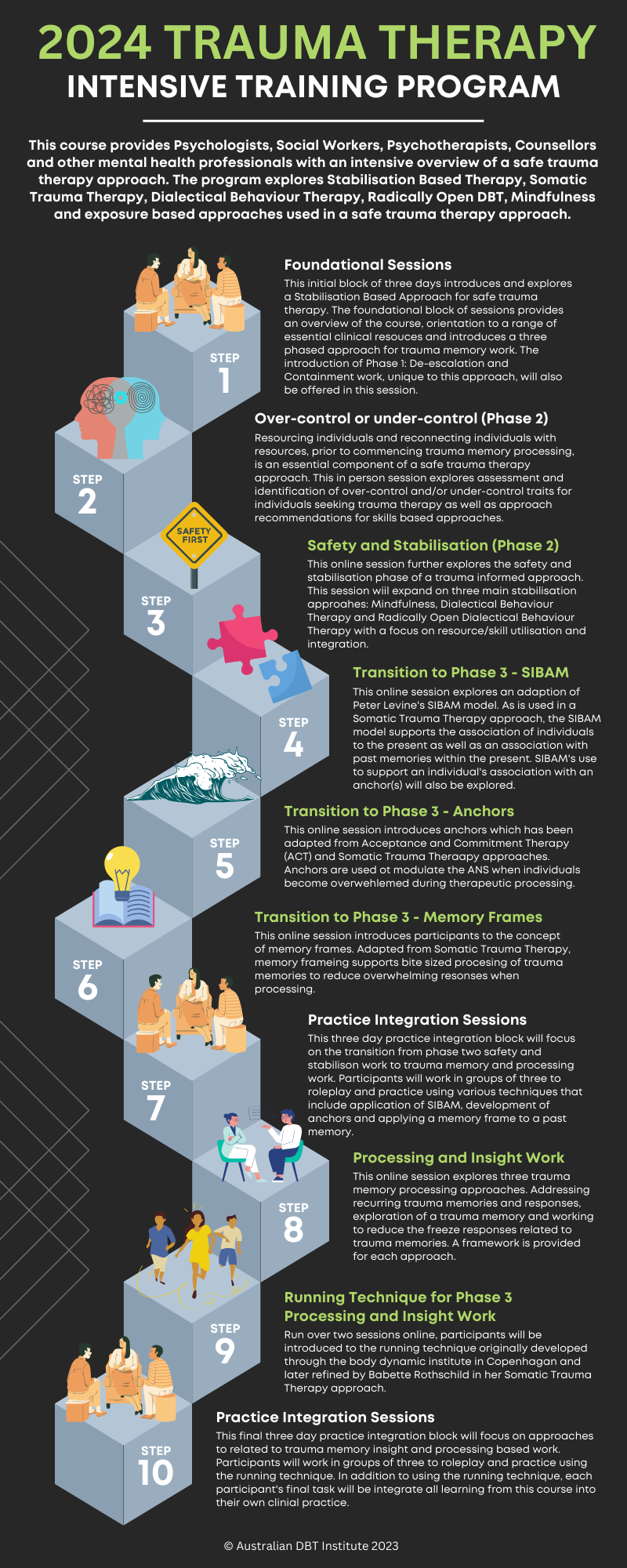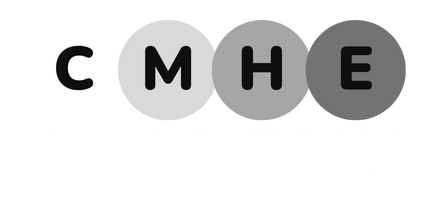2024 Brisbane Trauma Intensive Program
-
Dr. Peter L. King
-
Level: Advanced
-
Workshops: 60+ hrs
Write your awesome label here.
Course overview
This blended learning program is run over three weekend workshop blocks (3 days each) and 6 x Zoom sessions over a 7 month period in addition to all the components of the online learning program.
UP TO 20 APPLICANTS CAN ATTEND IN EACH LOCATION - MELBOURNE AND BRISBANE!
UP TO 20 APPLICANTS CAN ATTEND IN EACH LOCATION - MELBOURNE AND BRISBANE!
-
Somatic Trauma Therapy
-
Trauma Informed Approaches
-
Stabilisation Based Therapy
-
Dialectical Behaviour Therapy
Ongoing Access
Participants of this course have ongoing access to all materials provided through this CMHE Academy portal.
Further CPD
The Australian DBT Institute website www.dbtworkshops.com lists a range of training options. Click here to join our Mail list
Certificate
A certificate of completion is available on CMHE Academy in the final section of this program.
Copyright
All materials are copyrighted. When using the materials provided please acknowledge the author!
Write your awesome label here.
Zoom Preparation Sessions
To ensure that the workshops are interactive, zoom sessions and other online materials will prepare participants for each weekend intensive!
Write your awesome label here.
Weekend Intensive 1
23rd-25th Feb 2024
This weekend intensive focuses on clinicians consolidating a stabilisation based approach including assessment of OC & UC.
Write your awesome label here.
Weekend Intensive 23rd-5th May 2024
This weekend intensive focuses on clinicians transitioning clients from the stabilisation to processing and insight work.
Write your awesome label here.
Weekend Intensive 3 2nd-4th Aug 2024
This weekend intensive focuses on structuring processing and insight work when providing a safe trauma therapy approach.
Zoom Master Classes:
Six Saturdays between 10am and 1pm
Participants of the online program as well as the Melbourne and Brisbane programs can access Zoom Master Classes LIVE or watch the recording of sessions in preparation for the weekend intensives! An initial zoom session to orientate participants to the Trauma Therapy Intensive and online resources will be held on Saturday 10th February 2024 from 9am!
-
Reviewing Safety & Stabilisation (9th March 2024)
-
Working with the SIBAM Model (23rd March 2024)
-
Establishing Anchors (6th April 2024)
-
Developing Memory Frames (20th April 2024)
-
Identifying a Client's insight and processing preferences (22nd June 2024)
-
Introducing the Running Technique (20th July 2024)
Why should clinicians take this course?
This program provides clinicians with a clear and practical approach to providing safe trauma therapy. The focus is on working with individuals with emotion regulation difficulties and preparing individuals for safe trauma memory processing and insight work.
Following both a Somatic Trauma Therapy and Stabilisation Based Therapy approach, the Trauma Intensive Workshop is split into three phases. Participants follow the phase-based approach with their clients and this is replicated within the treatment. The program is scheduled over 6 months to support progress with your identified clients using this safe trauma therapy approach.
Following both a Somatic Trauma Therapy and Stabilisation Based Therapy approach, the Trauma Intensive Workshop is split into three phases. Participants follow the phase-based approach with their clients and this is replicated within the treatment. The program is scheduled over 6 months to support progress with your identified clients using this safe trauma therapy approach.
PHASE ONE: CONTAINMENT, SAFETY & STABILISATION
- Reducing risks of trauma therapy is the focus of this workshop and the foundation of the entire training.
- Reducing risks of trauma therapy is the focus of this workshop and the foundation of the entire training.
- Theoretical material includes: psychology of stress and trauma – including the role of dissociation; physiology of stress and trauma – including how brain and nervous system communicate during and following traumatic events;
- Defining types of trauma clients; “putting on the brakes” for containment, and safety, and regulating hyperarousal.
- Experience with basic body awareness, muscle toning, boundaries, and the use of resources will provide the basis for direct practice during the remainder of the training.
- Development and identification of client resources, skills and strategies for stabilisation
PHASE TWO: TRANSITION TO PROCESSING AND INSIGHT
- Theory and technique of therapeutic treatment will be the focus of this workshop.
PHASE TWO: TRANSITION TO PROCESSING AND INSIGHT
- Theory and technique of therapeutic treatment will be the focus of this workshop.
- Both cognitive and somatic sides of transference and countertransference will be explored.
- Memory theory will be presented as it applies to traumatic memory.
- In groups of three, participants will begin practicing Peter Irvine’s SIBAM dissociation model as a multifaceted tool that can be used to enhance resolution of trauma.
- Participants will also be encouraged to use the theory they have learned to develop their own techniques.
PHASE THREE: PROCESSING AND INSIGHT WORK
- Integration of both theoretical and practical material from all three workshops will be the focus, reinforcing the bridge between theory and practice.Issues involved when trauma therapy is the sole aim of treatment, as well as when it is a part of long-term psychotherapy, will be addressed.
- The BODYnamic ‘running technique’ will be introduced as an imaginal, mind/body integrative procedure for reawakening the flight reflex and reducing hyperarousal.
- Participants will be supervised in making relevant choices of techniques both during role-plays and during client consultation.
PHASE THREE: PROCESSING AND INSIGHT WORK
- Integration of both theoretical and practical material from all three workshops will be the focus, reinforcing the bridge between theory and practice.Issues involved when trauma therapy is the sole aim of treatment, as well as when it is a part of long-term psychotherapy, will be addressed.
- The BODYnamic ‘running technique’ will be introduced as an imaginal, mind/body integrative procedure for reawakening the flight reflex and reducing hyperarousal.
- Participants will be supervised in making relevant choices of techniques both during role-plays and during client consultation.



